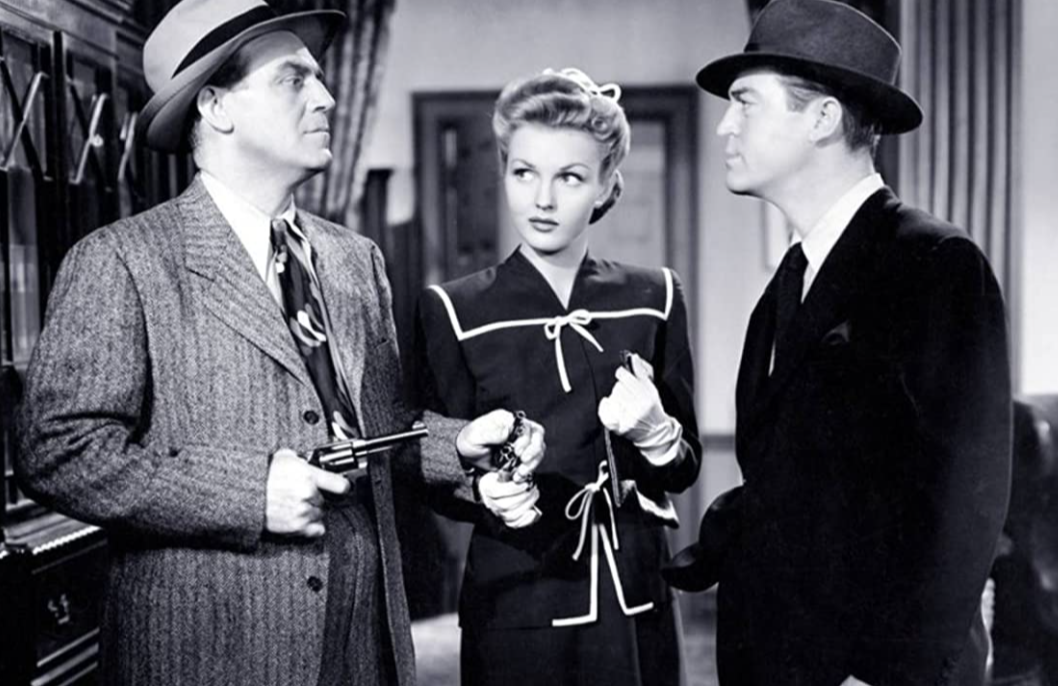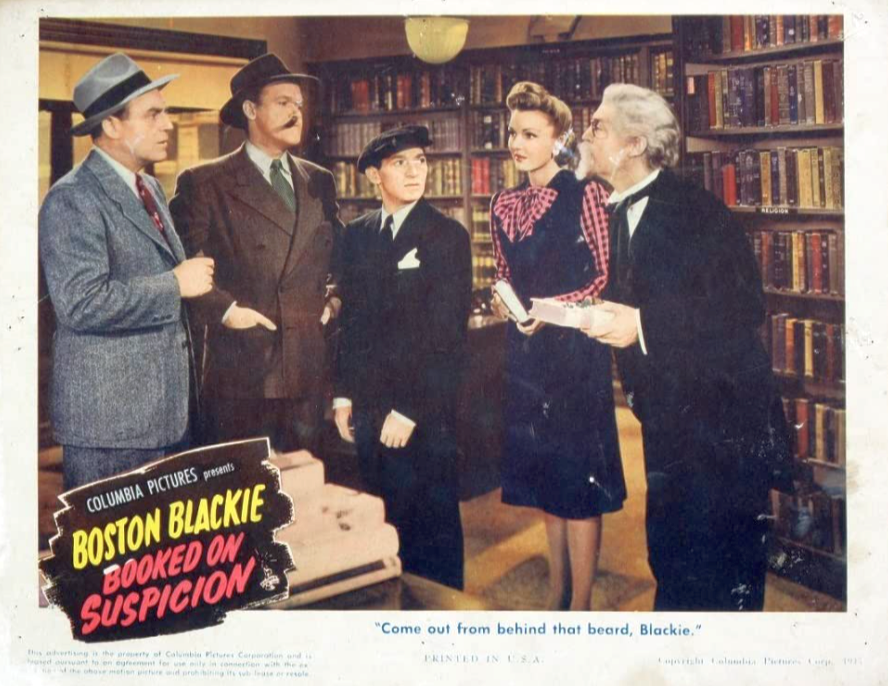Review: Boston Blackie Booked on Suspicion (1945)
Posted by Ivan G. Shreve, Jr. on Aug 21st 2014
Businessman Arthur Manleder (Lloyd Corrigan) has just acquired a rare book store from owner Wilfred Kittredge (George M. Carleton)…but his investment is in jeopardy when Kittredge takes ill, and his doctor (Edward Keane) prescribes a strict regimen of bed rest. The doctor’s diagnosis has come on the eve of a book auction, and without Kittredge’s participation the turnout will be less stellar than usual. But Manleder’s pal, reformed safecracker/thief Horatio “Boston Blackie” Black (Chester Morris), has a solution—he’ll disguise himself as Kittredge, and no one will be the wiser. To compensate for his inexperience with rare books, he’ll rely on some coaching from one of the store’s clerks, Gloria Mannard (Lynn Merrick).
As the event gets underway, the E-ticket item is a rare (and autographed) first edition of The Pickwick Papers by Charles Dickens, sold on consignment to the shop by a man named Porter Hadley. Unbeknownst to Manleder and “Kittredge,” however, the book is a counterfeit…and when it’s sold to collector Alexander Harmon (Douglas Wood) for the princely sum of $62,000, an enraged Harmon reports the fraud to Inspector John Farraday (Richard Lane) once he learns of the deception. As is his modus operandi, Farraday is convinced that Blackie is behind the deed…so when he and sidekick Inspector Matthews (Frank Sully) happen upon Blackie leaning over the dead body of Hadley it’s pretty much done, sold, Bob’s your uncle, as far as Farraday is concerned.
Blackie naturally sets out to clear his name…a daunting task, to be sure—but since Boston Blackie Booked on Suspicion (1945) runs a mere sixty-six minutes it shouldn’t take him too long. (The title is also a bit of a misnomer—Mr. Black is never at any time escorted to the police station for the titular processing.)

Boston Blackie Booked on Suspicion is an average entry in the popular Columbia movie franchise; its brief running time is a plus, since the plot isn’t too compelling (to be honest, the only truly compelling bookstore in motion pictures is the one in The Big Sleep). But the actors are certainly game, and much of the pleasure in watching Booked on Suspicion is the jovial camaraderie between friendly nemeses Blackie and Farraday—Farraday is always convinced his antagonist isn’t on the level, but at least he maintains a sense of humor about it. Suspicion would be the swan song for character great Lloyd Corrigan as Arthur Manleder; the actor always did a first-rate job in portraying the eccentric financier, whether it be performing amusing bits of business or transforming a simple sentence into one long spoonerism. The Manleder character would return for one more Blackie film (Boston Blackie’s Rendezvous, with actor Harry Hayden in the role) before they retired him from the series.
After one go-round as Inspector Matthews (in the previous entry, One Mysterious Night), Lyle Latell handed off to Frank Sully the part of the stupefyingly dense cop sidekick; Sully would play Matthews in the remaining Blackie entries in which the character was featured. Frank, who always reminded me of an older Earl Holliman, later turned up in a number of late-period Three Stooges shorts at the same studio—but he’s perhaps best recognized as Noah Joad in The Grapes of Wrath (1940).
Lynn Merrick plays the femme fatale on Booked on Suspicion; for some odd reason our hero never quite learns not to trust the leading ladies in these movies, and Merrick’s Gloria is no exception. Lynn makes a return appearance (as a different character, of course) in A Close Call for Boston Blackie (1946), and she can also be seen in Voice of the Whistler (1945). Gloria is revealed to be the late Mr. Hadley’s accomplice; she entered into a partnership with him in order to raise enough money to help her husband Jack Higgins (a convict on the lam) continue to elude the cops. Higgins is played by Steve Cochran in his feature film debut; Columbia shared his contract with Sam Goldwyn, and Goldwyn used him as a bad guy in Danny Kaye vehicles like Wonder Man (1945) and The Kid from Brooklyn (1946). Cochran would go on to make a lot of noise at Warner Brothers, where his best remembered roles include movies like White Heat (1949), The Damned Don’t Cry (1950) and Tomorrow is Another Day (1951).

The Boston Blackie film franchise often distinguished itself by featuring directors that went on to bigger and better things. Sadly, this would not be the case for Suspicion helmer Arthur Dreifuss. Beginning as a choreographer, he went on to direct many a B-picture for Producers Releasing Corporation, as well as “Jungle” Sam Katzman at Monogram (he did a lot of their teenage melodramas and musicals in the late 1940s). Dreifuss’ best-known directorial effort remains the 1962 feature based on Brendan Behan’s play, The Quare Fellow (starring Patrick McGoohan), but he’ll return to sit in the director’s chair next time for Boston Blackie’s Rendezvous (1945). And don’t forget—there’s plenty of Chester Morris-Richard Lane action on Outside the Law, our popular Boston Blackie CD collection!

